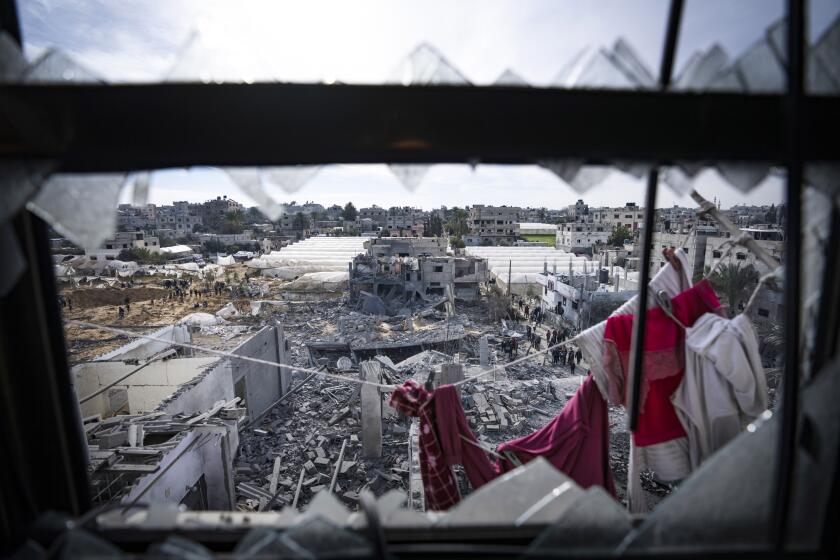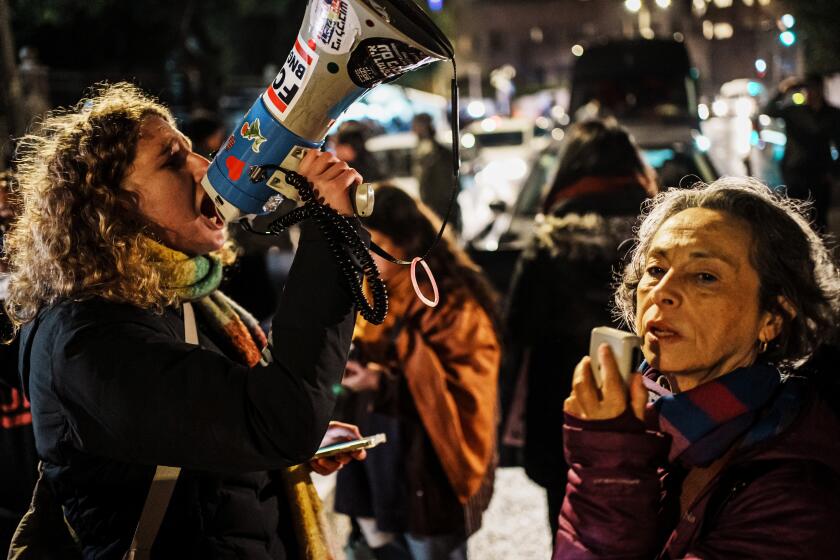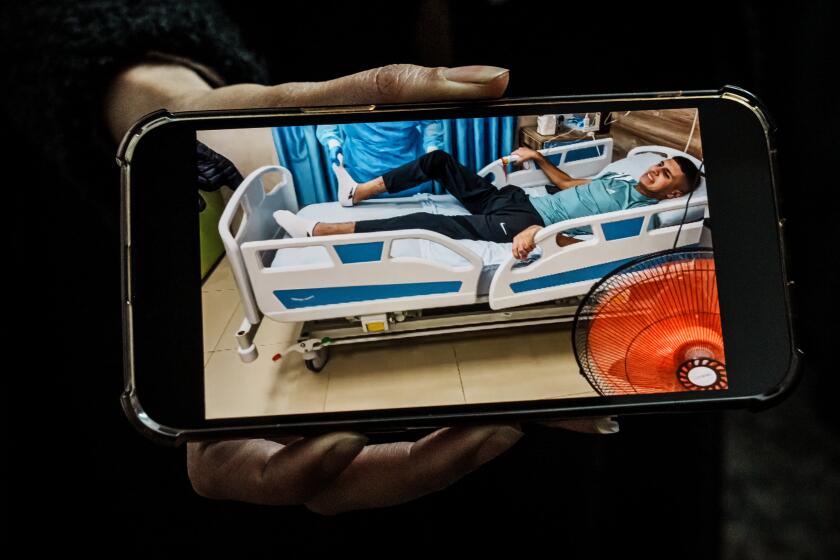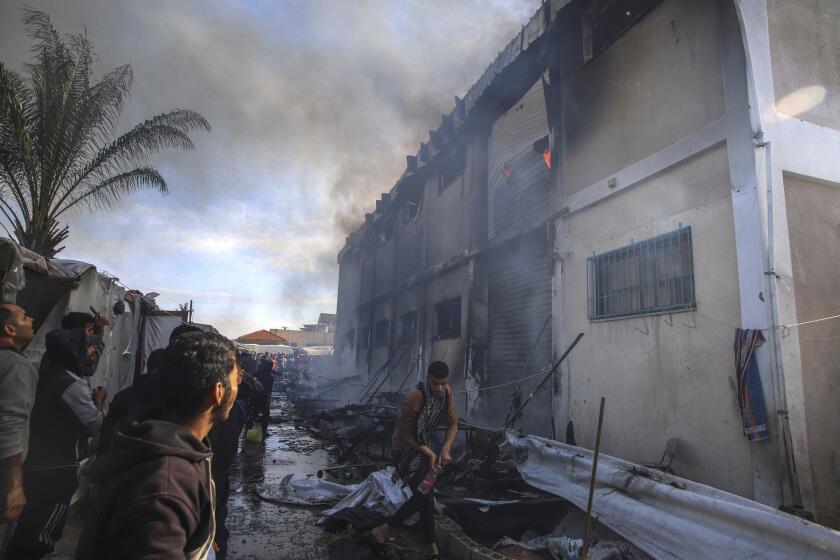Gaza cease-fire and hostage release talks appear to stall as Netanyahu and Hamas trade blame
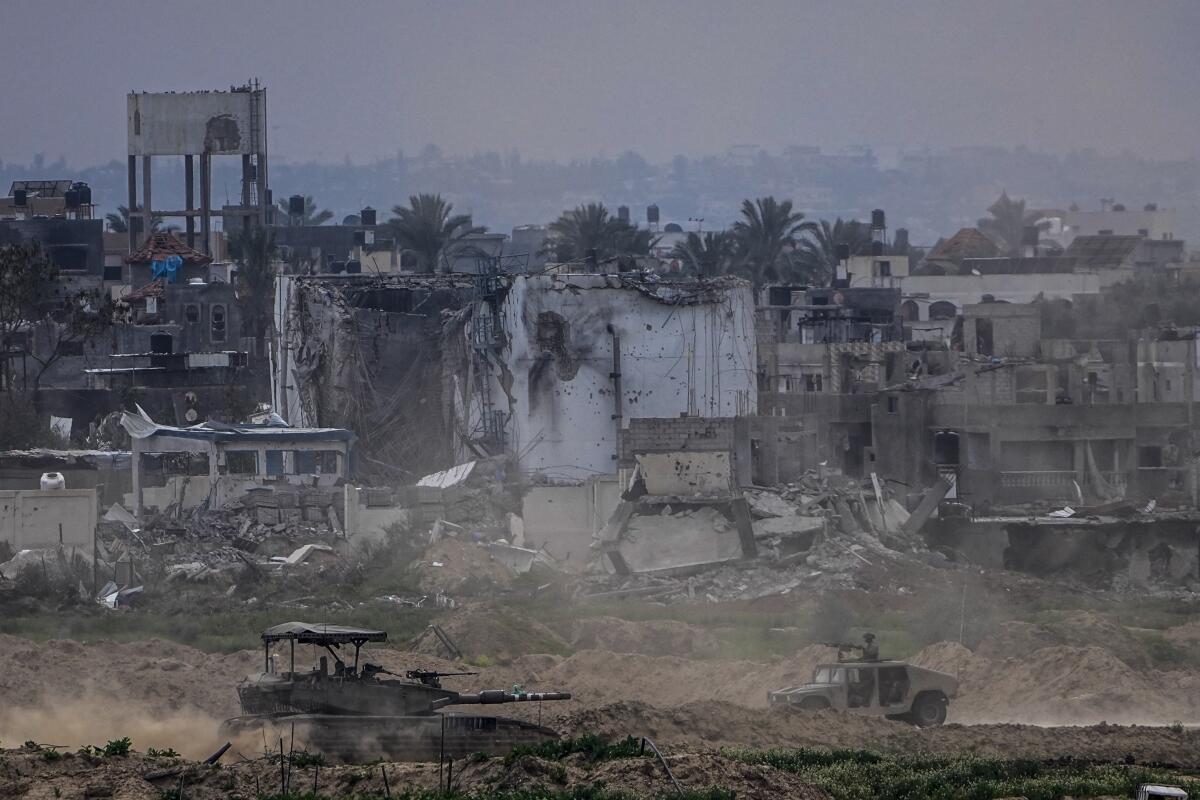
- Share via
RAFAH, Gaza Strip — International efforts to broker a cease-fire between Israel and Hamas suffered a setback on Wednesday as Israel reportedly recalled its negotiating team and Prime Minister Benjamin Netanyahu accused Hamas of hobbling the high-stakes negotiations with “delusional” demands.
Netanyahu’s remarks came hours after local media reported that the Israeli leader had ordered a delegation not to continue talks in Cairo, sparking criticism from families of the roughly 130 remaining captives, about a fourth of whom are believed to be dead.
The relatives of the hostages said Netanyahu’s decision amounted to a “death sentence” for their loved ones.
The mediation efforts, steered by the United States, Egypt and Qatar, have been working to bring the warring sides toward an agreement that might secure a truce in the months-long war, which has killed more than 28,000 Palestinians, most of them women and children, according to health officials in Hamas-controlled Gaza. The fighting has destroyed vast parts of the Gaza Strip, displaced most of the territory’s population and sparked a humanitarian catastrophe.
“In Cairo, Israel did not receive any new proposal from Hamas on the release of our captives,” Netanyahu said in a statement. “A change in Hamas’ positions will allow progress in the negotiations.”
Gazans crammed into Rafah along the Egyptian border have no place to escape as Israeli attacks hit ever closer in a final bid to rescue remaining hostages.
Hamas said Netanyahu was to blame. Senior Hamas official Osama Hamdan told the Associated Press that Israel had put forward a proposal that strayed from agreements reached during earlier cease-fire talks.
On Tuesday, CIA chief William Burns and David Barnea, the head of Israel’s Mossad spy agency, attended the talks in the Egyptian capital, but there were no signs of a breakthrough. The talks continued Wednesday at a lower level, even as deadly violence persisted in Gaza and along Israel’s border with Lebanon, where fighting has simmered since the war broke out.
Israeli media reported Wednesday that Netanyahu told his delegation not to return to the talks unless Hamas softens its demands.
Netanyahu has vowed to continue the war until “total victory” over Hamas and the return of all the hostages.
Hamas has said it will not release all the captives until Israel ends its offensive, withdraws from Gaza and releases a large number of Palestinian prisoners, including top militants. Netanyahu has called those demands “delusional.”
More than three months into the Israel-Hamas war, the families of hostages held in Gaza have grown disillusioned with Israel’s military operations.
The plight of the hostages has deeply shaken Israelis, who see their lengthy captivity as an enduring symbol of the failure of the state to protect its citizens from Hamas’ attack.
A group representing the families of the hostages called Netanyahu’s reported decision to keep the delegation away from the talks “scandalous” and said the families would set up a “mass barricade” outside the Israeli Defense Ministry unless Netanyahu agreed to meet them.
Over 100 hostages were released during a weeklong cease-fire in November in return for 240 Palestinians imprisoned by Israel.
The war, which erupted after Hamas launched a surprise attack into Israel on Oct. 7, killing some 1,200 people, mostly civilians, and taking around 250 captive, ground on as the talks appeared to stall.
Teenage friends Angelina, who is Palestinian, and Adar, who is Jewish Israeli, talk about the Hamas attacks on Israel and Israel’s war on Gaza. ‘It’s OK to disagree.’
Palestinians began evacuating the main hospital in the southern Gaza town of Khan Yunis, according to videos shared by medics on Wednesday. Weeks of heavy fighting had isolated the medical facility and claimed the lives of several people inside it.
The war, now in its fifth month, has devastated Gaza’s health sector, with less than half of its hospitals even partially functioning as scores of people are killed and wounded in daily bombardments. Israel accuses the militants of using hospitals and other civilian buildings as cover.
Khan Yunis is now the main target of a rolling ground offensive that Israel has said will soon be expanded to Gaza’s southernmost city, Rafah. Some 1.4 million people — over half the territory’s population — are crammed into tent camps and overflowing apartments and shelters in the town on the Egyptian border.
The videos of the evacuation in Khan Yunis showed dozens of Palestinians carrying their belongings in sacks and making their way out of the Nasser Hospital complex. A doctor wearing green hospital scrubs walked ahead of the crowd, some of whom were carrying white flags.
The Israeli military said it had opened a secure route to allow civilians to leave the hospital, while medics and patients could remain inside. Troops have been ordered to “prioritize the safety of civilians, patients, medical workers, and medical facilities during the operation,” it said.
The military had ordered the evacuation of the hospital and surrounding areas last month. But as with other health facilities, medics said patients were unable to safely leave or be relocated, and thousands of people displaced by fighting elsewhere remained there. Palestinians say nowhere is safe in the besieged territory, as Israel continues to carry out strikes in all parts of it.
Experts say Israel’s deadly raid on a West Bank hospital may have violated international laws, including a ban on combatants posing as doctors or civilians.
The Gaza Health Ministry said last week that Israeli snipers on surrounding buildings were preventing people from entering or leaving the hospital. It said 10 people have been killed inside the complex over the past week, including three shot and killed on Tuesday.
The ministry says about 300 medical staff were treating some 450 patients, including people wounded in strikes. It says 10,000 displaced people were sheltering in the facility.
The war in Gaza has become one of the deadliest and most destructive air and ground conflicts in recent history. At least 28,576 Palestinians have been killed, mostly women and children, according to Gaza’s Health Ministry, which does not distinguish between civilians and combatants. More than 68,000 people have been wounded in the war, including about 11,000 in need of evacuation for urgent treatment, according to the ministry.
About 80% of Gaza’s 2.3 million people have been driven from their homes, large areas in northern Gaza have been completely destroyed and a humanitarian crisis has left a quarter of the population starving.
The International Court of Justice’s ruling comes at an early stage in South Africa’s case alleging that Israel’s actions in Gaza amount to genocide.
In northern Israel, meanwhile, a rocket attack wounded at least eight people when one of the projectiles hit a home in the town of Safed on Wednesday.
Israel carried out airstrikes in southern Lebanon in response, killing four people, including a Syrian woman and her two Lebanese children, and wounding at least nine, Lebanese security officials and local media said.
The U.N. children’s agency condemned the killings of “two innocent children” and called “for the protection of children in times of war and at all times.”
Israel and Lebanon’s Hezbollah militant group, which supports Hamas, have traded fire along the border nearly every day since the start of the war in Gaza, raising the risk of a wider conflict. Hezbollah did not immediately claim responsibility for the rocket attack.
Shurafa reported from Rafah and Magdy from Cairo. Melanie Lidman in Tel Aviv and Bassem Mroue in Beirut contributed to this report.
More to Read
Sign up for Essential California
The most important California stories and recommendations in your inbox every morning.
You may occasionally receive promotional content from the Los Angeles Times.
